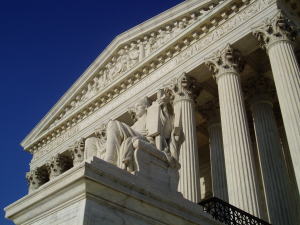 The Supreme Court decided recently that a Muslim prisoner could definitely grow a half-inch beard, and some blogs I read had some theories about what this will mean for religious freedom jurisprudence more generally. So, if you’re into that sort of thing, I’ve collected them here for your convenience:
The Supreme Court decided recently that a Muslim prisoner could definitely grow a half-inch beard, and some blogs I read had some theories about what this will mean for religious freedom jurisprudence more generally. So, if you’re into that sort of thing, I’ve collected them here for your convenience:
Austin Dacey over at Religion Dispatches thinks that, between Holt and Hobby Lobby, the Supreme Court is really lowering its standards on this whole “religious freedom” deal. He points out that under the Religious Freedom Restoration Act, religious exemptions are justified if the burden on religion is “substantial” – and the court has had a pretty hard time narrowing down what that means.
Justice Alito’s opinion has some ideas about how not to narrow down what beliefs need protecting: It doesn’t matter if there’s another way to practice your religion. It doesn’t matter if the practice isn’t religiously obligatory. It doesn’t matter if the belief is “central” to one’s religion. And it doesn’t matter if the belief isn’t widely shared by other members of the sect/faith group/whatever.
Under this broad a framework, are there any circumstances under which you could clearly say a burden is insubstantial? And if every burden is substantial, can we meaningfully decide what religion merits protection? Dacey isn’t sure, but he’s right that this is a question the courts are probably going to have to tackle pretty soon, especially as more and more organizations claim exemptions from Obamacare.
Meanwhile, Dawinder Sidhu at Religion and Politics is looking at a different part of the case, and it’s making him worried about the fate of affirmative action. Part of the reason the justices ruled in favor of Mr. Holt and his half-inch beard was that their regulation against beards didn’t give any examples of situations in which beards hindered their safety interests. Instead, they relied on general concerns about the need for security and to identify inmates easily. The court said that wasn’t good enough: violating someone’s religious practice would only be allowed if there was a specific information related to that religious practice that justified it.
So, what does this have to do with affirmative action? Affirmative action policies can’t manage the kind of specificity the Court is demanding in this case. Even though the Court accepts that colleges have an interest in promoting racial equality, under this kind of reasoning the general principle is less important than the specific reasons for picking Candidate A over Candidate B – and if you picked Candidate A because they’re black, that’s racial discrimination.
Finally, you should read the notorious RBG’s concurrent opinion on the Holt case. I am going to quote it in full:
Unlike the exemption this Court approved in Burwell v. Hobby Lobby Stores, Inc., accommodating petitioner’s religious belief in this case would not detrimentally affect others who do not share petitioner’s belief. On that understanding, I join the Court’s opinion.
I think she might still be upset about how Hobby Lobby turned out, guys.